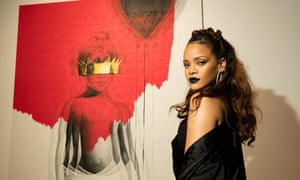
The launch of Rihanna’s eighth studio album was so obviously, resoundingly botched that you kept imaging her mentor Jay Z running around the offices of his streaming service Tidal shouting, “Don’t panic! Don’t panic!” like Clive Dunn in Dad’s Army. After months of careful preparation, involving a mobile-only website that transmitted cryptic messages and the unveiling of the artwork in an LA gallery, Anti mistakenly appeared on Tidal on Wednesday afternoon, was promptly bootlegged, then hastily shunted out as a free download.
It’s tempting to say the confused launch somehow fits with Anti itself, which even the most vociferous Rihanna fan might be forced to concede is quite a confused-sounding album: a Coldplayish acoustic ballad called Never Ending rubs shoulders with wilfully soupy, experimental R&B; psychedelia breathes the same air as a wafty interlude that sounds like a luscious two-step soul number deprived of its bubbling rhythm track and a peculiar combination of Auto-Tuned vocals and 80s AOR guitar – courtesy of Extreme’s Nuno Bettencourt – turns up alongside a pastiche of old-fashioned Muscle Shoals soul.
On the most basic level, Anti looks like a concerted attempt to steer Rihanna away from the world of manufactured pop. Amid the sagas of romantic woe and the inevitable references to marijuana, there are a lot of lyrics about doing things her own way, being more creative, and a pointed-sounding line about her ability to “cover shit in glitter and turn it gold”. The kind of immediate, bulletproof pop smash on which Rihanna’s career has rested to date is conspicuous by its absence, as are the kind of writers who provided them. The closest it comes to the stuff that Stargate or Sia Furler have sold her in the past is Kiss It Better, which has an ineffaceable chorus, albeit sung over a sparse musical backdrop that’s the diametric opposite of the dense EDM-influenced pop that fuelled We Found Loveor Diamonds.
The sense that Rihanna might have developed a case of the “Serious Artists” is compounded by the artwork, which comes complete with an excruciating little poem, written in braille so that the visually impaired can be mortified by it as well. “I sometimes fear that I am misunderstood,” it opens, before suggesting that “what I chose to say is of so much substance that people won’t understand the depth of my message”, which is certainly one way of interpreting her oeuvre to date, including Cheers (Drink to That), S&M and, indeed, Cockiness (Love It). “She may be the queen of hearts, but I’m gonna be the queen of your body parts,” she sang on the latter, demonstrating her unfathomable depth.
In a risk-averse world, there’s something brave about Anti, and at its best, its daring pays off: it remains to be seen whether it represents a momentary swerve off-piste or what you might call a complete Ri-Ri-invention. It’s hard to work out from its contents whether in a few albums’ time its author will be back to churning out neon-hued anthems or embedded even deeper into the musical leftfield, because its contents are neither the kind of unqualified success that confidently maps out a future direction or the kind of unmitigated disaster that requires her to beat a hasty retreat. Perhaps the answer hinges on the vexed issue of how fans who’ve previously bought into the idea of Rihanna as an imperious provider of bulletproof pop will take to an album that’s sprawling, uneven, exploratory and opaque: the sound of an artist who’s worked out what she doesn’t want to be, without really deciding what she does.
No comments:
Post a Comment